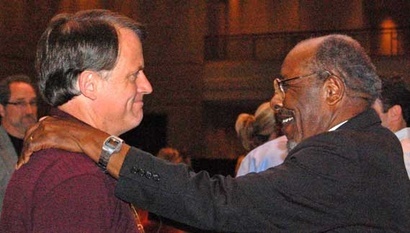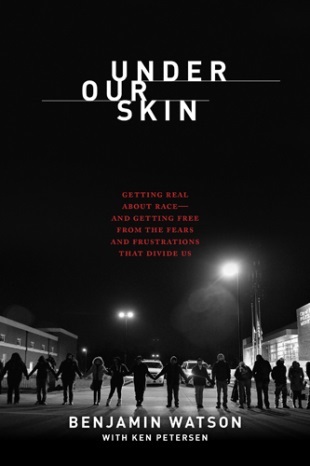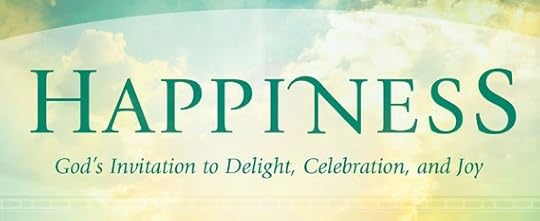Randy Alcorn's Blog, page 154
January 22, 2016
Biblical Optimism: The Glass That’s Half Full Now Will Forever Overflow

Regardless of our expectations or resolutions, 2016, like every year since we were evicted from Eden, will bring both wonderful and profoundly difficult moments.
What we need is a perspective on our coming year that’s hopeful, yet grounded in eternal certainties. No Christian should be a pessimist. We should be realists—focused on the actuality that we serve a sovereign and gracious God. Because of the reality of Christ’s atoning sacrifice and His promises, biblical realism is, ultimately, optimism.
If we build our lives on the solid foundation of Jesus Christ’s eternity-shaping redemptive work, we can be optimists. Why? Because even our most painful experience is but a temporary setback. Our pain and suffering may or may not be relieved in this life, but will certainly be relieved in the next. That is Christ’s promise—no more death, crying or pain; he will wipe away all our tears (Revelation 21:4). Indeed, any other foundation is sand, not rock. It will inevitably disappoint us.
Knowing that our suffering will be once and for all relieved and God will use it for our eternal good (Romans 8:28) doesn’t make it easy, but it does make it bearable. So too does the promise, “The sufferings of this present time aren’t worthy to be compared with the glory that will be revealed in us” (Romans 8:18). Same for the profound truth that our present sufferings are light and momentary, but are achieving for us something weighty, glorious and eternal (2 Corinthians 4:17).
Locking our minds onto these truths allows joy in the midst of suffering. Jesus said, “Happy [makarios] are you when men hate you, when they exclude you and insult you. . . . Rejoice in that day and leap for joy, because great is your reward in heaven” (Luke 6:22-23). We who will one day enter into our Master’s happiness can frontload that happiness into our lives today.
Paul said, “I rejoice in my sufferings” (Colossians 1:24), and James said, “Consider it pure joy, my brothers, whenever you face trials of many kinds” (James 1:2). The apostles didn’t enjoy suffering, but they rejoiced in the midst of it, because they trusted their gracious God’s sovereign plan. They believed in His constant presence, that we are more than conquerors through Him, and nothing shall separate us from the love of Jesus (Romans 8). They looked forward to Christ’s return, their bodily resurrection, and the redemption of God’s creation.
Christ said to His disciples, who would suffer much, “Rejoice that your names are written in heaven” (Luke10:20). Our optimism isn’t “health and wealth gospel” wishful thinking which claims that God will spare us from suffering here and now. Peter said, “Rejoice that you participate in the sufferings of Christ, so that you may be overjoyed when his glory is revealed” (1 Peter 4:13). Christ’s future glory, in which His children will participate, is the reason for our present rejoicing while suffering.
As Christ’s followers, we know this world isn’t evolving into something better. Even if bright spots seem few, we have much to be grateful for. Thanking God and others feeds our perspective and helps us enter into our Master’s happiness today. It then spills over to those around us.
Understanding the biblical doctrine of Heaven, the New Earth and the resurrection will shift our center of gravity and radically change our perspective. We'll realize we never pass our peaks in this life. We don’t need a bucket list because we'll live forever as part of a great adventure far better than anything here and now. This realization is what the Bible calls “hope,” a word used six times in Romans 8:20-25, the passage in which Paul says that all creation longs for our resurrection and the world’s coming redemption.
Don’t place your hope in favorable circumstances, which cannot last. Place your hope in Christ and His promises. Jesus promised He will return, raise us, and live with us on a new, Redeemed Earth, where we’ll behold God’s face and joyfully serve Him forever (Revelation 22:3-4).
I’m not optimistic about everything, but I am very optimistic about the future of all who trust Jesus. Our glass is already half full and will one day, for God’s beloved children, be completely and eternally full to overflowing.
In Tolkien’s Return of the King, Aragorn says, “Dawn is ever the hope of men.” King David wrote, “Weeping may last for the night, but a shout of joy comes in the morning” (Psalm 30:5).
The night may seem long for God’s people, but the truth is: once morning comes, it will never end. Neither will Joy. Every day will be better than the one before. It isn’t Pollyanna but Jesus who promises we really will live happily ever after.
photo credit: Maria Shanina via Unsplash
January 20, 2016
Do Christians, Muslims and Jews Worship the Same God?
In December, Dr. Larycia Hawkins, associate professor of Political Science at Wheaton College, become the center of controversy when she publically posted a statement on her Facebook page saying:
I stand in religious solidarity with Muslims because they, like me, a Christian, are people of the book. And as Pope Francis stated last week, we worship the same God. ...As part of my Advent Worship, I will wear the hijab to work at Wheaton College, to play in Chi-town, in the airport and on the airplane to my home state that initiated one of the first anti-Sharia laws (read: unconstitutional and Islamophobic), and at church.
She also invited others to join her campaign. A few days later, Dr. Hawkins cited “the post-Vatican II Roman Catholic tradition,” “Pontifical writings” and several theologians in a statement defending her argument that both Christians and Muslims worship the same God.
Wheaton subsequently placed Dr. Hawkins on administrative leave, to give them “more time to explore theological implications of her recent public statements concerning Christianity and Islam.” (They have since begun the process to initiate termination-for-cause proceedings.)
I don’t know the details, but I do believe Wheaton, as a historically evangelical Christian university, is right in taking this matter very seriously. I trust that their leadership is attempting to deal with the matter in a spirit of Christlike grace and truth.
I have tried to explain to other believers why I think it’s very unhelpful and inaccurate to say “Christians and Muslims and Jews worship the same God.” Sometimes the response is, “Well, what I mean when I agree with that is….” Okay, but the problem is, most people who hear and say this are NOT thinking anything that is consistent with revealed Scripture or a Christian worldview. So even if we imagine we can say it, making certain mental qualifications that permit us to do so, what’s the point when the great majority of people listening to us understand our statement in a way that is contrary to the truths of God’s Word?
While it feels closer to accurate to say “Christians and Jews worship the same God,” surely this also is not at all helpful when mainstream Jewish beliefs (the religion, not the race) deny the trinity, the deity of Christ, the incarnation, Jesus’ Messiahship, His redemptive work on the cross and His centrality in the fulfillment of God’s plan revealed in not only the New Testament but also the Old Testament.
Of course, Christianity is very Jewish in that three-quarters of the Bible centers around God’s work with Israel. And Jesus himself was Jewish, raised in a Jewish family, which means that Christianity and Judaism have much in common with each other that they do not share with Muslims. (Muslims affirm the Old Testament and recognize Jesus as a great prophet—which does not mean they believe and follow all that Jesus actually said. Indeed, they deny that Jesus was actually crucified, while religious Jews deny that Christ’s death had redemptive properties that can save people.)
There are Messianic Jews and congregations that embrace the Gospel of Jesus, and countless ethnic Jews all over the world who love Jesus. But these people are racial Jews who as followers of Jesus the Messiah are included under “Christians” not “Jews” in the statement in question. Why? Because the statement “Christians and Jews worship the same God” is not about race, but religion; theological beliefs, not bloodlines. Similarly “Muslims” speaks of religion, and is not at all synonymous with “Arabs,” any more than “Christian” is synonymous with the western nations, including the U.S., who were traditionally called “Christian nations.”
In fact, there are many Arab Christians in the world who are faithful followers of Jesus. A Muslim can become a Christian or a Jew, but then he is no longer a Muslim. Likewise, one who was raised in a Christian home can become a Jew or a Muslim, and someone Jewish by race can become Christian or Muslim by religion. It’s vital not to confuse the racial and religious meanings of the terms. Otherwise confusion is inevitable.
There are certain beliefs that Christians have in common with Jews but not Muslims, and others that Jews and Muslims have in common that are utterly contrary to Christian beliefs—for instance that Christ is not God and there is no trinity. When one believes that God is not triune, and that Christ is not God, and that Jesus was not sent into the world by the Father to redeem lost humans, then the God he or she worships is definitely not the God Christians believe in.
I have had many conversations with sincere Christians who speak about Jews being saved by one covenant and Christians by another, and claim that the church and Israel are absolutely and completely different, but are both God’s chosen people and therefore go to Heaven when they die. But this ignores the fact that some Israelites under the Old Covenant clearly rejected the true God and were not part of God’s eternal family. It also ignores the reality that the New Testament Church was nearly exclusively Jewish from its beginning, and Gentile Christians only later outnumbered Jewish Christians later, after the gospel was taken to the Gentile cultures.
When Jews come to faith in Christ they remain ethnic Jews but are no longer religious Jews, though they are free to bring their Jewishness, including Sabbath rests and feasts and traditions, into their walk with Jesus. In their conversion, they become part of the church, the body of Christ, in union with Gentiles: “There is neither Jew nor Gentile, neither slave nor free, nor is there male and female, for you are all one in Christ Jesus” (Galatians 3:28). Yes, a slave is still a slave, men and women are still men and women, Jews remain ethnic Jews and Gentiles are Gentiles, but they are united once and for all in their common belief in Christ—which makes them distinctively different from those of any status, gender or ethnicity that do not know Jesus.
After Jesus ascended and the Holy Spirit descended, some Jews came to Jesus, some did not. Those who did were saved, those who didn’t were not. Yet I have been told by some Christian “missionaries” to Israel, “We are here to help the people and serve and love the nation, not to evangelize.” Well, I’m all for helping and serving and loving, but if people don’t know Jesus as their Savior, it is ultimately terribly unloving not to share the Gospel with them because it’s imagined they are saved under the Old Covenant. The ethnically Jewish leaders of the early church, including all the apostles, recognized that for any Jew or Gentile to know God and be saved from their sins, they must turn to Jesus, and be saved by grace, through faith (Ephesians 2:9-10).
People don’t just need a strong national or racial identity—they need a new identity in Christ that transcends nation and race. This is not just true of Irish living in Ireland or Massachusetts, Swedes living in Sweden or Minnesota, Arabs living in Iraq or California, but also those ethnically Jewish, whether or not they were raised as religious Jews, and whether they live in New York, Australia, or Israel.
So, it is obviously true that “Christianity, Judaism and Islam share certain beliefs, including monotheism, that there is one God.” But that is very different than saying the God we believe in is the same.
Every statement that blurs the Gospel of Jesus Christ, the center of all redemptive history, should be avoided by all followers of Jesus. That’s why I am convinced that we should thoughtfully reject statements such as “Christians, Jews and Muslims all worship the same God.” It is sometimes a well-intentioned statement, but it blurs the utter uniqueness of Jesus Christ, the Father’s Son, the God-Man, King of Kings and Lord of Lords, the world’s sole Redeemer and Hope, who said to religious Jews and to all people of all religions and backgrounds, “I am the Way, the Truth and the Life, not one comes to the Father but by Me” (John 14:6).
Should we love and respect Jews and Muslims, and seek to live in harmony with them? Absolutely! But no one is helped by confusing the differences between these faiths. I don’t think many serious religious Jews are trying to downplay the differences between Judaism and Christianity and Islam, nor are serious Muslims trying to do so. It’s mainly modern professing Christians, more a product of our everything-is-equal-including-worldviews culture than historic biblical Christianity, who are minimizing the differences between the Objects of our faith. Despite our commonalities, we offer significantly different answers to the question, “Who is God, what is He like, what has He done for the world and what does He call us to do in response to Him?”
Kevin DeYoung, one of my favorite bloggers, says it well:
We have quite a few Wheaton alumni in our church, and we seem to send one or two high school graduates off to Wheaton every year. Recently, I got an email from one of our students at Wheaton. The email had a number of good questions (he’s a very bright young man), all having to do with the current controversy over whether Muslims and Christians (and Jews) worship the same God. I thought it might be worthwhile, with his permission, to post my brief letter on my blog.
******
Dear Mike [not his real name],
I was going to write you an even longer reply, but then I saw this article on The Gospel Coalition website. It does a great job explaining why we should not say Muslims and Christians worship the same God. It also gets into the question you asked about whether Jews and Christians worship the same God. In a redemptive historical sense, there is a way in which this is true (certainly more than is true with Islam). But on this side of the incarnation, we still have the same Trinitarian and Christological problems.
One of the reasons this controversy is so difficult is because the phrase “worship the same God” can mean different things and can be heard in vastly different ways.
Consider a few examples:
Do Muslims and Christians understand God in the same way? No. The differences are massive. Either God exists in three persons and Jesus of Nazareth was God in the flesh or these notions are blasphemous errors.
Do both Muslims and Christians worship God in ways that are pleasing to the one true God? No. As evangelical Christians, we must say that worship that is pleasing to God is worship centered on Christ. The central affirmation of our faith—Jesus Christ is Lord—is categorically rejected by Muslims. Their worship is an affront to God’s revelation in Christ. I imagine most Muslims would say our worship is an affront to Allah.
Do Muslims and Christians both find salvation in their worship of God? No. We are saved by faith in Jesus Christ (John 14:6). While inclusivists argue that we can be saved through Jesus Christ apart from explicit faith in him, almost all evangelicals throughout history have insisted that conscious faith in Christ is necessary for salvation. Even if inclusivists are right (and they’re not), there is quite a difference between ignorance of Christ and a conscious rejection of Jesus as the Son of God. Moreover, I think many Muslims would find it insulting to their faith for Christians to say, “You’ll be saved because you believe in Christ without knowing it.”
Does the worship of Muslims and Christians reach the same God even though their theology about God is vastly different? Perhaps the object of worship ends up being the same, despite the fact that the worshiping subjects are thinking of very different Beings. This is the sophisticated argument some are trying to make. But I don’t think this argument works either. Since there is only one God, it is true that the one God—the God and Father of our Lord Jesus Christ–sees Muslims worshiping and, perhaps, we can even say that the prayers and alms of some Muslims “have ascended as a memorial before God” (Acts 10:4) or that in one sense they are seeking after God and trying to feel their way toward him (Act 17:27). And yet, if this is what we mean to say, the language of “worshiping the same God” is bound to be confusing, for God does not “hear” the prayers of the Muslims (in the covenantal sense) and does not receive their “worship” as worship.
In other words, from a Christian understanding, the Muslim faith is not just a little off or incomplete, it is idolatrous, demonic, and false. It is hard to see how the language of “worshiping the same God”—despite whatever philosophical distinctions we may put in place—can stand alongside this theological evaluation.
In Christ,
Pastor Kevin
January 18, 2016
Brotherhood and the Color of Our Skin

 Today, January 18, is Martin Luther King, Jr. Day. While Eternal Perspective Ministries doesn’t close for every holiday, every year I make sure we’re closed for this one. I want to send a message that it’s a serious and legitimate holiday that deserves observance. It’s less about one man than it is about a vision, a movement, a value of reconciliation between people of every tribe, nation and language. (The picture above is of me greeting Dr. John Perkins, one of my heroes in the faith.)
Today, January 18, is Martin Luther King, Jr. Day. While Eternal Perspective Ministries doesn’t close for every holiday, every year I make sure we’re closed for this one. I want to send a message that it’s a serious and legitimate holiday that deserves observance. It’s less about one man than it is about a vision, a movement, a value of reconciliation between people of every tribe, nation and language. (The picture above is of me greeting Dr. John Perkins, one of my heroes in the faith.)
I’ve been reading Under My Skin: Getting Real about Race—and Getting Free from the Fears and Frustrations That Divide Us by Benjamin Watson, which I highly recommend. Much of what Benjamin writes about has reminded me of what I learned in researching for my novel Dominion, which addresses racism.
In this excerpt from Dominion below, my main character Clarence Abernathy, an African American journalist, discusses issues related to race with to his friend and coworker Jake. There’s a lot of action in the book, but this is a fairly long dialogue, one that will hopefully help you think a little differently about racial issues:
“Since you were a kid, how often have you really thought about the color of your skin?” Jake asked.
“Honestly?”
“Yeah. Of course.”
“Don’t say, ‘Of course.’ White folks think they want blacks to be honest with them, but usually it turns out they don’t. How often have I thought about the color of my skin? Try every waking hour of every day of my life.”
“Are you serious?”
“Dead serious. Did you ever look through those black magazines I gave you?”
“Yeah, I did. It was really amazing. Every picture was of blacks—every subject of a feature, every writer, every advertisement had people with black skin. I don’t know if I saw a single white, except a few in Urban Family.”
“Now imagine,” Clarence said, “if when you grew up every magazine was like that, every television commercial and every billboard showed only people of another skin color, not yours. How do you think it would have made you feel?”
“Marginalized, I suppose. Out of it. Like maybe something was wrong with being white.”
“Exactly,” Clarence said. “That’s just how it was when I grew up. I’d look through all those magazines and the Sears and Montgomery Wards catalogues and wonder what was wrong with being black. Now if I was white, I wouldn’t think about it either. When you’re in the driver’s seat, you don’t think about conditions in the back-seat. When you’re born into a privileged class you just take it for granted. The people who think about it are the ones who weren’t born privileged. It’s a birthright thing. Kids who have plenty of food don’t think about the fact they have food. But when you’re hungry, it’s always on your mind.”
“I guess I don’t think of myself as being privileged,” Jake said. “I mean, I’ve worked hard for what I’ve got.”
“I’m not saying you didn’t. And I’m not blaming you for anything, Jake. It could just as easily have been me born white and you born with my good looks. But that’s not how it happened. Didn’t you tell me once your grandfather ran a hotel?”
“Yeah, in Colorado. His father built it. He worked with him from the time he was a boy. They did the building and maintenance and my great-grandmother did all the cooking and cleaning, then passed that on to my grandmother. Nothing came easy for them.”
“I’m sure it didn’t. But you’re telling me your great-grandparents established their business back in the 1800s and they passed skills and resources and economic experience and training from their generation down to yours. Right?”
“Right.”
“So you’re the beneficiary of generations of hard work and education and opportunity and freedom. But see, while your great-grandparents were doing all that, my great-grandparents were forced to till the Mississippi soil and pick cotton until they couldn’t straighten their backs. They worked even harder than your ancestors, but
the difference was none of it benefited their children or grandchildren. It all benefited the next generation of white children.”
Jake sat there, not sure how to respond.
“So you see,” Clarence continued, “your ancestors worked to pass on advantages to you, and my ancestors worked to pass on advantages to you. I’m not trying to lay a guilt trip on you. But you have to realize that’s the way it was.”
“But my ancestors weren’t slave owners,” Jake said.
“Are you sure?”
“Well, I’m pretty sure, at least going back to my great-grandparents.”
“But it’s not that easy. See, the whole country, south and north, benefited economically from the work of the slaves and the sharecroppers. Your ancestors worked hard. Mine worked even harder, but with one big difference. Yours worked hard as free people, choosing the kind of work they’d do. They experienced the rewards of their work. That’s capitalism at its best. But mine worked hard at the bloody end of a whip, and they didn’t receive the rewards of their work. Their white masters did, the white plantation owners did, and during sharecropping the white landowners did. With the dirt pay during Jim Crow days, the whole white community benefited at the expense of black folk, who just scraped by. Didn’t you tell me your daddy went to Harvard?”
“Yeah, he did.”
“I’m sure he worked hard to get there. But my daddy dropped out of school in third grade to work fourteen-hour days on land owned by white folks, to help feed his family. Your daddy was born with an opportunity my daddy wasn’t. Your daddy’s opportunity and your ancestors’ opportunity came, at least partially, at the expense of blacks.”
“I’ve never thought of myself as privileged—certainly not at somebody else’s expense.”
“Privilege is like being born tall in a world that revolves around basketball,” Clarence said. “If you’re a seven footer, basketball’s going to come easier than if you’re five foot six. Now a seven footer can say, ‘I had to work hard to become a great basketball player.’ Yeah he’s right, but he’d be a fool not to realize he was born with advantages that helped his dream come true. There’s no substitute for hard work. But your daddy’s hard work and my daddy’s hard work didn’t bring them equal advantages, not financially or educationally. Now character, that’s something else.”
“Maybe I’ve gotten used to privilege and it feels like I earned it all,” Jake said.
“Well, if some white folk are too slow to see their advantages, some black folk are too quick to see their disadvantages. I’m the first one to admit that, Jake. See, my daddy never let his disadvantages rob him of hope or keep him from working hard and building the best life he could. I hear some black folk whining all the time, when the truth is they’ve got all these advantages Daddy never dreamed of. The whining makes me sick. But when I hear some white people born with the silver spoon in their mouths talk about how everybody just needs to pull themselves up by their bootstraps, well that makes me sick too. Truth is, black people have had freedom such a short time, we haven’t gotten real experienced at using it. Then there was the whole welfare thing and all those freethinking white university professors in the sixties that pushed this me-first family-destroying lifestyle that cut us off at the knees. I don’t even want to talk about that, it makes me so angry. I’ve never been happy with liberals or conservatives on racial issues. Anyway, next time you think maybe I’m angry, there’s a good chance you’re right.”
Jake nodded. He seemed unsure what to ask next, but Clarence didn’t need more prompting.
“Tom Skinner used the example of a baseball game. The game starts, and one team—let’s call them the White Sox—takes the lead. Next thing you know they’re up 10-0. The other team, Black Sox, has been trying to get their attention that something’s wrong. Well, come the seventh inning the White Sox finally notice the Black Sox have been playing the whole game with one hand tied behind their back. So, they say, ‘Okay, we’ll untie your hand. Batter up.’ Well, by now the score is 20-0, and we’re in the bottom of the seventh inning. The White Sox have mastered the skills necessary to play the game. The Black Sox are now able to play with both hands, true enough, but they’re used to playing with one and they don’t have the experience yet and their one arm is really sore, some of their shoulders are dislocated, and they’ve still got the rope burns. Given all that, and the score being 20-0, who do you think is going to win the game?”
“Yeah,” Jake said. “I hear you.”
“And by this time, some of the Black Sox are going to give up trying because who can overcome that lopsided score? They’ve gotten so used to being disadvantaged that even when they’re untied they don’t think there’s any hope of catching up. Some of the black team adjust and excel, yes, but some just feel despair and anger, and some just give up and sit on the bench or throw rocks at the privileged team or fight with each other in the dugout.”
“Racial problems really aren’t getting better, are they?” Jake said, voice weighed down.
“For some people, they are,” Clarence said. “For others, it’s pretty much the same as always. And for other folks, it’s just getting worse.”
“I’m embarrassed to say I never used to understand all this talk about racism. But lately the lights have started to turn on. Race is a burden for you it’s never been for me.”
“Burden is a good word. More than anything else, I just get tired of it all. I’d like to put on white skin for a few weeks, not because I want to be white—I don’t—but just so I could take a break, have a vacation. Just get the hay bales off my back awhile, that’s all. So I wouldn’t have to face the issue again and again every time I see a police officer looking at me, or I drive up next to someone at a stoplight and hear them engage their power locks. Some days I’m just so worn out by it all. I can leave my briefcase at home, but I can’t leave my skin at home. Being black is a full-time job. Every class I was ever in, every white church I ever went to, I was expected to be the black voice, as if all blacks think alike. Somebody’s doing a story and they need to talk to a black man, they call me. You know Jake, if you ever get dog-tired at the Trib, you can put your head down on your desk and snooze a few minutes. I’ve seen you do it. I can’t do that.”
“Why not?”
“Because when you do it, you’re just a man taking a snooze, probably because you stayed up late working hard. If I did it, I’d be a black man—lazy and probably up late partying or taking drugs. Cheating my employer by stealing his time. Proving black men are as bad as everyone thinks.”
“Come on, Clarence, you’re overreacting. Nobody would think that.”
“Maybe not everybody. But some would. That’s just a fact, Jake, whether or not you believe it. Dr. King used to tell the story of a man walking past ten drunk men, nine of them white, the other black. The man shook his head and said, ‘Just look at that black drunk, now would you?’”
Jake looked at Clarence like a student listening to a professor, in over his head, but struggling to understand.
“Have you ever figured out,” Clarence asked, “why I dress up when we go to a store, even a sporting goods store?”
“Beats me. Just thought you like dressing up. It’s always struck me as weird, I admit.”
“I love to go casual. Jeans and a sweatshirt, that’s what I really like,” Clarence said. “But I also want to shop in peace. I get tired of the salesclerks asking, ‘Can I help you?’ every five minutes.”
“What?”
“I don’t like being watched.”
“Clarence, what are you saying?”
“That I’m a black man,” Clarence’s voice thundered, “and black men are expected to be shoplifters! There. Can you understand that?”
“Sorry, man. Didn’t mean to upset you.”
“It wasn’t you. Sorry.” Clarence raised his hands and waited to regain his composure. “If you’re a white man wearing jeans and a sweatshirt, you’re just another customer. If you’re a black man wearing jeans and a sweatshirt, you’re just another suspect. Dressing up makes me look successful. So it helps compensate for my skin color. Sometimes it’s enough to keep store security from breathing down my neck all the time.”
“I had no idea,” Jake said. “Are you sure—”
“That I’m not overreacting? Hey, I’ve got friends who are doctors and attorneys, and they do the same thing. If they dress comfortable, they’re a suspect. It gets really old.”
Clarence and Jake talked for another hour.
“Got to get home, bro,” Clarence said. He hesitated, then added, “Hey, thanks for asking me about this stuff. And thanks for listening to me. I feel better just talking about it.”
Jake put his arm around him. “Thanks for talking to me, brother. It gives me a lot to think about. It helps me understand you better. And know how to pray for you.”
The two men walked out the door side by side.
January 15, 2016
Pastors, You Must Speak Up: One in 5 U.S. Abortions Are Performed on Women Identifying as Evangelical Christians

Some Christians may think, “Believers don’t have abortions, only un-churched people do.” This simply isn’t true. In fact, 43 percent of women obtaining abortions identify themselves as Protestant, and 27 percent identify themselves as Catholic. So two-thirds of America’s abortions are obtained by those with a Christian affiliation. As I share in my book Why ProLife?, one of every five US abortions—about a quarter-million a year—are performed on women who identify themselves as born-again or evangelical Christians.[i]
Many church-attending women, younger and older, have had abortions. Many church-attending men got those women pregnant and either pressured, encouraged, or at least agreed with the mother to abort their children.
EPM staff member Kathy Norquist, who prays with a group in front of Oregon’s largest abortion clinic, shares stories that reflect the reality of these statistics:
Talking with Christians Who Come to Abortion Clinics
Once a month, some friends and I stand outside the abortion clinic praying, holding signs, and seeking to offer alternatives to men and women who choose to abort their babies. It’s a difficult place to go to, and I often don’t look forward to it. But once I’m there, it becomes a powerful time of intercession and opportunities and the Lord blesses us in many ways.
Sadly, there are many Christians who come to the clinic for abortions or to assist others in getting them. Here are just a few of our encounters:
One young woman who already had an abortion was coming back for a checkup. It was heartbreaking to hear she was a Christian and involved in a church. We were able to offer her post-abortion healing information to deal with the obvious guilt she was carrying.
One of our women spoke with a young girl and her mother (presumably), parked on the street. “I could tell her conscience was working, because she said things like ‘This was such a hard decision for me. You don't know my situation. I put a lot of thought into this and it’s the best decision for me and my baby. I'm a Christian; I'm with you in spirit, but respect my decision and don't keep talking to me, and God bless you, Ma'am!’, shutting her eyes to block me out. I wasn't harassing her, but kept up with what I hoped was just gentle, logical suggestions, like adoption.”
Another morning we spoke with a grandmother who had brought her granddaughter for an abortion. She told us she was very much against it, but couldn’t talk her granddaughter out of it. Yet she was the one who drove her to the clinic. We told her to be prepared that one day her granddaughter might very well have anger toward her for facilitating her decision by driving her. It turns out the grandmother was a Christian, involved in an evangelical church which has a post-abortion Bible study for women, and her husband is a church planter!
We spoke with a woman who was just getting into her car. She was a committed believer who had brought her Christian daughter to get an abortion. The mother was adamantly opposed to the abortion and tried to talk with her daughter for days, but the daughter was determined. The mother was heartsick. Yet, she thought that even though she desperately didn’t want her daughter to go ahead with it, she had to bring her to support her and not let her go through it alone.
I believe this mom sincerely thought she had no other choice and was doing the right thing by her daughter. But I don’t think she truly believed it was a child (who at the moment of conception has a unique DNA with enough information to fill 50 sets of encyclopedias), a human life worthy of protection just like all of us. Because if she did believe it, she couldn’t have any part of helping her daughter kill her own grandchild. What would have happened if she had refused to bring her daughter? Possibly the daughter would have seen her mom’s commitment and changed her mind, possibly she wouldn’t have found another way to get there, possibly…we just don’t know, but her mom would have done the right thing.
We’ve encountered several people who said they were Christians, yet either brought someone or were getting an abortion themselves. Silence in the church sends a message that it’s okay. This hurts women who could be saved from an abortion decision, resulting in life for innocent preborn children. Abortion really does kill children.
Note: EPM has officially become the sponsor for this outreach ministry. If you’re in the Portland area and would like to participate in prayer and presence, please contact me via EPM, and I will connect you with the right people. It would be a great encouragement to us if God were to lead you to this ministry!
Church leaders should take responsibility for the sad state of the church just described. The abortion issue isn’t about the church needing to speak to the world. It’s about the church needing to speak to itself first, and then to the world. Sanctity of Human Life Sunday is a great starting place, but it’s not enough. We must address the pervasive prochoice arguments that daily bombard Christians.
We must not hold back from speaking the truth just because there’s no consensus about abortion in our church. Consensus may never come—but our job is to still teach what the Bible says in no uncertain terms. And knowing that when we address this subject many women who’ve had abortions will be touched, we must offer forgiveness and emotional support.
Some pastors fear “laying a guilt trip” on women in our churches who’ve had abortions. On the contrary, we must address it for their sake. If we don’t speak out, our people will continue to suffer—and continue to kill their babies and assist others in killing their babies—without knowing the forgiveness and healing of Christ.
Pastors should resist the temptation to decide for their people not to see pictures that show the reality of what abortion is. No one should be forced to view such pictures, but neither should others be deprived of the opportunity. By not showing actual pictures of abortion, we keep people from emotionally experiencing the children’s humanity and the horrors of abortion, and leave them liable to consider abortion when they, their family, or friends face an unwanted pregnancy. (We should carefully prepare our audience, allowing people to look away or close their eyes without having to leave or call attention to themselves.)
As Christian leaders, we must realize that we’ll be held accountable, both in this life and in eternity, for how we deal with this issue. We need to take deliberate and significant measures to stop the killing, to minister to our hurting women, and to make a difference in our community. The desire to be popular and avoid people’s disapproval is a common reason for church leaders to hold back in pro-life efforts. But for every reason we have, we should be ready to answer a question on the last day: “Was that reason more important than the lives of all those children I created in my image?”
[i] Rachel K. Jones, Lawrence B. Finer, and Susheela Singh, “Characteristics of U.S. Abortion Patients, 2008,” Guttmacher Institute, May 2010.
January 13, 2016
Introducing the Happiness Bible Study (plus a giveaway)

The new Happiness: God’s Invitation to Delight, Celebration, and Joy study deals with an issue that’s important for us as followers of Jesus and critical to our mission of sharing Him with our world. For 1,800 years the church held a shared understanding of happiness. Preachers and theologians recognized happiness as a good thing God created, and they spoke accordingly. They recognized that the innate desire to be happy motivated people to seek Jesus.
The church’s message across the centuries was that following Jesus provided the way any person could find forgiveness, meaning, and fulfillment—that is, happiness. Then over the past hundred years a change occurred. A different idea of happiness took root in the church. Happiness came to be associated with the world. Words like blessed and joy, which originally meant happiness, took on new connotations.
Godly, well-meaning believers began to preach and teach that happiness is an enemy of holiness. Christians were told they shouldn’t desire happiness but rather an unemotional form of joy. Sadly, in the process many passages of Scripture lost their richness and strength because we no longer understood the true meanings of the words.
We need to reclaim the truths that our desire for happiness is God-given and that Jesus is the way to happiness. We need to reclaim the meanings of numerous biblical words that speak to us of happiness. We need to join God in transforming His church through the happiness He intended for us to enjoy. God knows that all people desire happiness. And He wants them to know that the happiness they seek is found in a relationship with Him. —Randy Alcorn
Learn more about the study:
The Happiness Leader Kit includes a Bible study book, a copy of Randy’s Happiness book, social-media content, and a DVD with a promotional video and six 15- to 20-minute teaching sessions from Randy Alcorn introducing each session. (Additional Bible study books are available from our store.)
Session titles include:
1. Joy and Happiness: The Conflict
2. Hardwired for Happiness
3. The Happiness of God
4. Idolatry and Happiness
5. Holiness and Happiness
6. The Happiness of Heaven
Features:
- Teaching videos with Randy Alcorn
- Biblically rooted and gospel-centered content
- Leader guidance
- Content and learning activities for individual study
- Six-session workbook with group and personal components (Read an excerpt from the Bible study book)
Watch excerpts from the DVD:
EPM is giving away one copy of the Happiness Leader Kit ($89.99 value). Enter below by Monday, January 18 at 11:59 p.m.
January 11, 2016
John Stott and the Right to Life

Like many others, I deeply loved John Stott, his books and his contribution to the church of Christ. I really appreciated what he had to say about unborn children:
Since the life of the human fetus is a human life, with the potential of becoming a mature human being, we have to learn to think of mother and unborn child as two human beings at different stages of development. Doctors and nurses have to consider that they have two patients, not one, and must seek the well-being of both. Lawyers and politicians need to think similarly. As the UN’s “Declaration of the Rights of the Child” (1959) put it, the child “needs special safeguards and care, including appropriate legal protection, before as well as after birth”. Christians would wish to add “extra care before birth”. For the Bible has much to say about God's concern for the defenseless, and the most defenseless of all people are unborn children. They are speechless to plead their own cause and helpless to protect their own life. So it is our responsibility to do for them what they cannot do for themselves.
From Authentic Christianity © 1995 John Stott and Timothy Dudley-Smith.
This Sunday, January 17, is Sanctity of Human Life Sunday 2016.
Here are some resources EPM recommends, and that you and your church can use:
EPM allows readers to download the free 2004 edition of Randy Alcorn’s book Why ProLife? (The thoroughly revised and updated print edition is available through our store.)
ERLC offers a free bulletin insert.
The Colson Center provides a free 21 day prolife prayer guide to help Christians intercede and engage.
A video of one of Randy’s past Sanctity of Human Life messages is available on our site.
Photo credit: Oriol Martinez
January 8, 2016
Where Is Heaven, and What Are Some Major Misconceptions About Heaven?

Over the years, I’ve found that it’s a common misconception even among Christians that the present Heaven, where Christians go when we die, is the same place we will live forever. In fact, when we die we go to be with Christ, which is wonderful, but we are incomplete, in a pre-resurrected state, anticipating Christ’s return to earth, and our resurrections. As I develop in my book Heaven, the place we’ll live forever will be where God comes down to dwell with us, on the New Earth (Revelation 21:1-3).
I share more about this in the following video, filmed earlier this year when I visited Watermark Community Church. Pastor Todd Wagner and I sat down and discussed “Where is Heaven?”, as well as some common misconceptions about Heaven.
Photo credit: Elijah Hail via Unsplash
January 6, 2016
Our Recap of 2015, and Looking Ahead to 2016

Hope you enjoy this recap of our ministry’s past year, and our plans for the coming one. Happy New Year! —Randy
Randy’s 5 Most Read Blog Posts of 2015
A Plea to Christian Men - “Recently, in the wake of yet another Christian leader found to have committed immorality, Tim Challies posted a response, actually a plea to Christian men, written by his wife Aileen. I found it both concise and powerful.”
Pastoral Reflections on Gay Marriage: A Series of Five Short Videos – “Much has been said presenting a Christian response to same sex marriage. I’ve posted in previous blogs some excellent perspectives from others. But I haven’t heard anything better than the five brief videos below from Dan Franklin.”
Some Thoughts for Those Who Are Considering Divorce – “This is NOT an attack piece on the divorced. It is written for the many believers who may be considering a divorce too soon because it is a cultural norm.”
The One Thing My Daughter Remembered Most about My Parenting – “Some years ago, I sat with my daughters at a wonderful father/daughter banquet at our church. Someone at the table asked my youngest daughter, Angela, what I’d done that made the biggest impression on her.”
Should We Leave Our Children Inheritances? – “I think in order to understand the principle behind Proverbs 13:22, we need to compare what an inheritance meant in biblical times, versus what an inheritance means in this culture today. “
Randy’s 5 Bestselling Books through EPM’s Store in 2015
The Treasure Principle - God owns everything. I'm His money manager. What I call my money is really His. The question is, what does He want me to do with His money?
The Purity Principle - Impurity will always destroy us; purity always leads to higher pleasures! Choose wisely.
Why ProLife? - Infused with grace and compassion, and grounded in medical science and psychological studies, Randy Alcorn presents a solid case for defending both unborn children and their mothers.
Managing God’s Money - God cares a great deal more about our money than most of us imagine. The sheer enormity of Scripture’s teaching on this subject screams for our attention.
God’s Promise of Happiness - We know that we’ll experience unimaginable joy and happiness in Heaven, but that doesn’t mean we can’t also experience joy and happiness here on earth.
5 of the Many Ministry Projects We Supported through Book Royalties in 2015
Hope for Orphans – Support and training for Korean and Cuban orphanages.
Run Ministries – Iraqi refugee relief efforts.
Far Reaching Ministries - Chaplain Cadet training in South Sudan.
Elisha Foundation - Biblical encouragement for families of special needs kids.
Biblica - Equipping Chinese house churches with biblical resources.
5 of EPM’s Plans for 2016
Post more resources for those who read and speak other languages. We hope to impact more readers worldwide with resources about Heaven, giving, happiness, and more.
Spread Randy’s writing and teaching on the biblical truth about happiness. Through his books Happiness and God’s Promise of Happiness, blog posts, a DVD series on happiness, and a limited number of speaking engagements, we want to share the joyful news of God’s call for us to delight in Him.
Impact more prisoners through our book ministry. Each year, EPM sends thousands of Randy’s books to inmates in facilities across the United States. In 2015 alone we sent over 6,400 books. This outreach to those who are often forgotten by society is bearing much fruit for the kingdom!
Connect more individuals to Bible-believing churches. Randy believes it’s essential for people to find Christ-centered churches to help them in their spiritual growth. In 2015, we sent referrals to 46 individuals seeking to find a church home.
Reach more people with Randy’s teaching about the importance of an eternal perspective. Through social media, including Facebook, Twitter, Instagram, and YouTube, we have the opportunity to provide free resources on Heaven, sexual purity, suffering, and other topics that will help readers in their walk with Christ.
Would you like to join us in impacting eternity in 2016? Learn more.
Photo credit: Joshua Earle via Unsplash
January 4, 2016
What Will My Happiness Look Like in Heaven?

The following is an edited transcript of my interview with Tony Reinke, who invited me to be a guest on Desiring God’s “Ask Pastor John” podcast. You can also listen to the audio of this interview.
Randy, you wrote the bestselling book, Heaven . Now you’ve written Happiness . How will joy in eternity be similar or different from the joy that we can experience right now?
I think joy in eternity will be the same sort of thing we know as joy and happiness and delight right now. But it will be purified and absolute in the sense that, as Paul says, right now we are “sorrowful yet always rejoicing” (2 Corinthians 6:10). We live in a world under the curse. And so even as we rejoice with those who rejoice, we weep with those who weep (Romans 12:15). And that is right and it should be.
We don’t just paste on a smiley face as we look at a world of tremendous need, of children suffering. And there’s sex trafficking going on and you have all of these different things. So right now our happiness in Christ is something that can and should be very real. But at the same time we recognize we can’t be absolutely happy all the time. In fact, it would be inappropriate if we were, given the condition of the world.
But in eternity we will enter into our Master’s happiness (Matthew 25:21). I just love that the Master doesn’t say to His servant, “Muster up your own happiness and bring it here, and it is your duty to make yourself happy all the time.” Rather, He says, “Enter into my happiness.” And what makes Heaven such a desirable and wonderful place is that it’s permeated by the person of God. It is where God is. We shouldn’t want to be in a heaven without God.
First of all, it wouldn’t really be Heaven because it’s God who brings His nature to it—all of His attributes, including His happiness. So I think in this life here and now, we do get foretastes of the complete and total bliss, the utter happiness, of Heaven. And we can be happy even in the midst of great difficulty, just as The Valley of Vision, the book of Puritan prayers, models. It is full of words such as “happiness” and its synonyms. Yet it’s just so deep with the burdens and realities of a sin-defiled world—but always with the sense of hope, of blood-bought hope, of hope with substance and expectation that one day God is going to wipe away the tears from every eye, as Revelation 21:4 says. There will be no more suffering, no more pain. There will be no more separation. We will experience all of the realities of who God is, and every day will be better than the one before.
The old fairy tale ending—happily ever after—that’s not a fairy tale. That is God’s unfolding drama of redemption, the greatest story ever told, the ultimate redemptive story. And He promises us we will never pass our peaks. And we’ll live happily ever after in His presence, to His glory and for our good. And that magnificence should permeate our lives and our thinking today. We should not wait until we die to discover a taste of all that. We should be experiencing it daily even now.
photo credit: Christ Ford via photopin (license)
January 1, 2016
The Valley of Vision

Nanci and I love The Valley of Vision, which is a collection of brief and profound Puritan prayers compiled by Arthur Bennett (I love the leather edition linked to. It’s one of the few books worthy of having in leather!). We find them powerful and penetrating.
If you haven’t discovered the Puritans, I highly recommend that you do. They speak with an amazing biblically-based depth. They have been stereotyped as legalistic and impersonal and believing in an impersonal God, but in many hours of reading them I believe nothing could be further from the truth! While writing my book on happiness I was struck again and again with the Puritans’ belief in a happy God who called them to a life of happiness in Jesus.
They are a great corrective to the health and wealth gospel, in that they endured great suffering but trusted the God of sovereign grace and His providence and personal love and provision. This is the first entry in the book, but what follows is just as good:
The Valley of Vision
Lord, high and holy, meek and lowly, Thou hast brought me to the valley of vision,
where I live in the depths but see thee in the heights; hemmed in by mountains of sin I behold thy glory.
Let me learn by paradox
that the way down is the way up,
that to be low is to be high,
that the broken heart is the healed heart, that the contrite spirit is the rejoicing spirit, that the repenting soul is the victorious soul, that to have nothing is to possess all,
that to bear the cross is to wear the crown, that to give is to receive,
that the valley is the place of vision.
Lord, in the daytime stars can be seen from deepest wells, and the deeper the wells the brighter thy stars shine;
Let me find thy light in my darkness, thy life in my death,
thy joy in my sorrow, thy grace in my sin,
thy riches in my poverty thy glory in my valley.
photo credit: Theophilos Papadopoulos via photopin(license)



